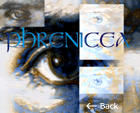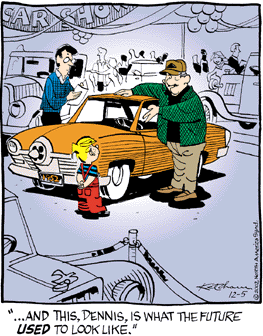|
The Phrenicea website is a not-for-profit "work in progress," whose primary purpose is to stimulate thought/discussion about the future, particularly among those that would not normally be so inclined. Phrenicea is a fictionalized account of what will occur in the first century of the new millennium. Online since 2000, it presents a mildly dystopian (rather than apocalyptic) midcentury scenario sans the Internet and web and its associated information disbursement. Supplanting that chaotic state that ultimately threatens human culture and civilization is the stability offered by the Phrenicea braincomb, inhabited by human brains nurtured not unlike bees in a hive. The name Phrenicea® is a portmanteau of phrenic (of the mind) and panacea (cure all). Looking at today's long-term trends as well as the rapid advancements in technology, especially related to computers, the Internet/web and biotechnology, one can only imagine the path where these will lead. That path is the basis for the Phrenicea vision.
The premise of the Phrenicea scenario of the future is that we give up trying to copy the human brain utilizing computer technology and artificial intelligence, and instead appreciate its amazing complexity by immuring our brains upon death and keeping them alive within a "braincomb" to function and assist those still living their ambulatory lives. The overarching thesis of the Phrenicea website is that biotechnology (specifically, the harnessing of man-made DNA) will be the predominant force of change in this century. Our love affair with computer technology will run its course and ultimately cause more harm than good. We will harness DNA's innate elegance for many non-biological purposes — offsetting the social and economic damage done by Information Technology. If the 20th century could be labeled the "Century of the Computer," then it is our view that the 21st century will become "The Century of DNA." What was accomplished with hardware (constructed of inorganic elements) will eventually be achieved with software (materials made organically). Here's a glimpse of our future with Phrenicea: Imagine a future without TV; without telephones; without automobiles; without the computers or the Internet. Imagine our world with over 12 billion people with very little fresh food. Fathom a world without schools or universities; without places of worship. Could this be the result of a nuclear holocaust or some great catastrophe? But then why would most people live comfortably past 100 years; keep fit without exercise; have children well into their seventies? This is a very different planet Earth in the mid-21st century — facilitated by the ubiquitous Phrenicea, a massive honeycomb-like entity containing live human brains. In presenting a somewhat "over-the-top" scenario of the future, whose donnée is that our technology will never match the sophistication of Nature's biology, we hope to trigger intellectual controversy and discourse — and consequently an interest in the future — arguably a worthwhile endeavor especially if it stimulates thought and concern about the present (i.e., where we are headed trend-wise). *****
Here's a quick overview of what you will find as you click through the Phrenicea site.
Download the (free!) short story. Visit your Future® and appreciate the present!
Why bother to ponder the future? NON SEQUITUR ©2004 Wiley Miller. Dist. By UNIVERSAL PRESS SYNDICATE. Reprinted with permission. All rights reserved.
NON SEQUITUR ©2004 Wiley Miller. Dist. By UNIVERSAL PRESS SYNDICATE. Reprinted with permission. All rights reserved.
"Oh, future shmuture..."? More than forecasting the weather, envisioning the future inevitably coaxes one to scrutinize the present. Unlike the study of the past, there's no concrete data from the future to work with. The natural tendency therefore is to extrapolate from present trends. Often these trends are already steering towards conditions not in the best interests of the individual, society, or the environment — local or global. Acknowledgement of problems now can be the first step towards averting bigger problems for our children — and theirs. The University of Hawaii's Research Center for Futures Studies puts it succinctly: Each of us has a role in the construction of whatever futures do come to pass. Humans have never before had more influence over the future of our environment, our biology, and indeed, of all life. This influence is a powerful force in the construction of our future... Futures Studies encourages the contemplation of many possible futures, and facilitates dialogue between groups with competing or conflicting visions. It seeks to transform the self-centered world of today into futures-oriented cultures for tomorrow. In this age of microsecond attention spans, student inspiration arises more from the web than from traditional didactic presentation. Leveraging that, while still being ancillary to a structured program of study, the Phrenicea website intends to instigate by presenting a fatidic scenario predicting the ultimate outcome of the Internet and biotechnology
It should be acknowledged here that we cannot predict the future with any certainty. Pondering the future is neither art nor science, and the pursuit is not an easy one. Everyone is qualified — and no one is qualified — to predict the future. Who could have predicted the web phenomenon thirty years ago? And too, there is no immediate reward. Time is always a prerequisite to determining success. Only time will tell if our tongue-in-cheek tagline, "Chronicling the Future," has any credence. If not, we might make the comics!
You are invited to become familiar with the Phrenicea scenario and to Visit Your Future® frequently at the Phrenicea website to debate its course. More importantly, it is hoped that by pondering the future you will be energized to have a hand in steering it by becoming more actively involved within the present.
Chronicling the Future®
Zoe Hunter
This page belongs to
Entire site ©2000-2026 John Herman. All rights reserved. |

